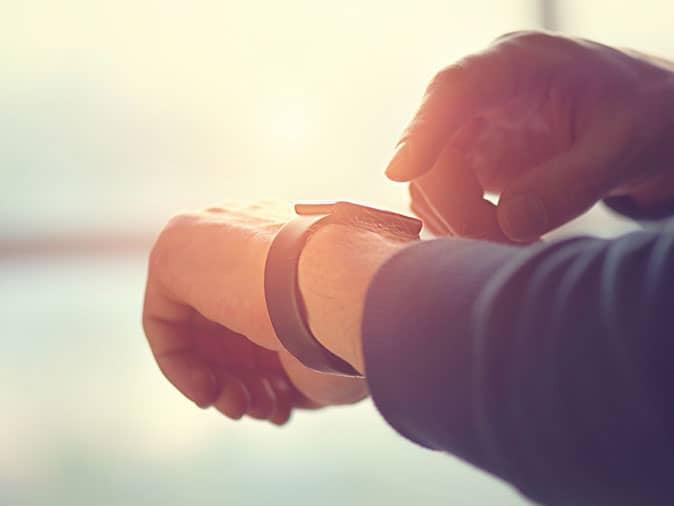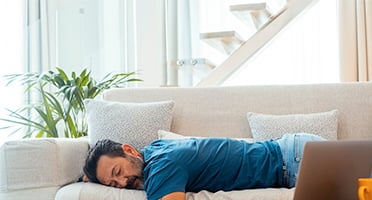Do you wear a smartwatch to bed? If you do, you know that it tracks your sleep. It provides data on how long you slept, how long you spent in each stage of sleep, and how many times you woke up throughout the night. More sophisticated watches estimate blood oxygen saturation, snoring, sleeping heart rate, and restlessness. You’d think you could diagnose your own sleep disorder with all that information, but a doctor still needs to provide a diagnosis. Here’s why.

How Do Smart Watches Track Sleep?
There are different ways smartwatches track sleep depending on the brand, but there are five overarching ways: motion detector, heart rate, respiration, blood oxygen, and environmental factors.
Accelerometers
An accelerometer is a small motion detector. There are multiple on your smartwatch, and as you sleep, it detects movements. It sends the data into an algorithm that estimates your sleep time and quality. These small motion detectors are how it tracks your steps and exercise, too.
Optical Heart Rate Sensor
The optical heart rate sensor is used for many different tracking purposes on your smartwatch, but it also tracks your heart rate while you sleep. Heart rate can vary when sleeping, but it tends to correlate with different sleep stages.
This sensor also plays a role in tracking your respiration. Your automatic nervous system plays a role in regulating your respiration, which helps determine your sleep stage. Respiration is an essential piece of data because it could indicate a sleep disorder when monitored by a doctor.
Microphone
Some smartwatches have a microphone that detects sounds, restlessness, and respiration. This helps the watch determine if you snore, move around a lot, or labored breathing.
Reflectance Oximetry
Have you seen the light on the inside of your smartwatch? That is the reflectance oximeter. It senses your blood oxygen saturation from the reflection of your blood through your skin.
16 Distinct Sleep Clusters
Smartwatches have come so far that preliminary studies are using the data collected to get a sense of which types of sleepers are susceptible to sleep disorders like insomnia. A recent study looked at 100,000 people in the United Kingdom and discovered 16 ways we can classify sleepers based on data from smartwatches. The study hopes to link its data to personal information such as medical history, present illness, medications, occupations, and lifestyle habits.
1: Insomnia with long sleep duration and midawake
2a: Irregular sleep schedule
2b: Fragmented sleep with short sleep duration
3a: Insomnia with normal sleep duration
3b: Insomnia with short sleep duration
3b-1: Insomnia with short sleep duration and long-term midawake
3b-2: Insomnia with short sleep duration and short-term midawake
4a: Longer 24 hour sleep/wake cycle
4b: Major
4b-1: Long sleeper
4b-2: Morning person
4b-3: Shorter 24 hour sleep/wake cycle
4b-4: Insomnia with short sleep duration and short-term midawake
4b-5: Insomnia with normal sleep duration and long-term midawake with less fragmented sleep
4b-6: Night person
5: Sleep without daytime sleep window
This data may help us predict sleep disorders in certain types of people as researchers can link it to known personal health data and may help predict sleep disorders. However, this data is preliminary and requires more research to be helpful in that aspect. For now, we still rely on sleep studies to help us determine sleep health.
Smartwatch Limitations
Smartwatches provide an overwhelming amount of sleep data, but there are limitations. First, the data is hard to interpret when you aren’t a doctor. Trying to diagnose yourself from data on your smartwatch may produce inflated or understated results. Meaning if you do have sleep apnea or insomnia, you might not catch it because the data from your watch is difficult to interpret. Or, you have sleep apnea or insomnia, and you couldn’t discover the severity in the sea of data.
Second, smartwatches use data collected from your wrist and infer subsequent data from it. For example, your smartwatch tracks your respiration based on your heart rate, not based on the oxygen going in and out of your airway.
Third, you have to wear it every night to get a good set of data, and data could be skewed if you wear it tighter one night than another. It’s essential to remember that while the data from your smartwatch is promising, you’ll still need to get a sleep test interpreted by a sleep doctor to get a diagnosis.
What Does This Mean for Sleep Apnea?
The study above talks exclusively about insomnia, but the data could be helpful in looking at sleep apnea, too. Sleep apnea is a sleep-breathing condition where you experience pauses in breathing for at least 10 seconds or longer. These pauses disrupt your sleep cycle because it forces your brain to awaken you to resume breathing. The above data looks at subsets of fragmented sleep and short sleep durations. With further scrutiny, these could link to sleep apnea and could potentially indicate that you need to order a home sleep study from SleepTest.com.
Test for Sleep Apnea with a Home Sleep Study
The only way to know if you have sleep apnea is through a sleep study. And the best kind of sleep study is one you can do in your own bed. But how do you know to get tested for sleep apnea?
Look at the symptoms of sleep apnea and monitor yourself to see if you experience things like daytime sleepiness, morning headaches, low energy, and more. Perhaps you can get an indication from your smartwatch that you’re up a lot during the night with a high heart rate, but the only way to know for sure is to get a sleep test.
Order Your Sleep Test Today
If you’re concerned that you may have sleep apnea, don’t wait. Order your sleep test today and get connected to a sleep doctor. You’ll receive your diagnosis within days, and you can discuss treatment options via telemedicine with one of SleepTest.com’s affiliate dentists or medical providers.

Feeling tired all the time, even after a full night’s sleep? You might be suffering from sleep apnea. Discover how an at-home sleep test can help diagnose the root cause of your fatigue—and get you back to feeling like yourself.

Spring is here—and so is the pollen. For the millions dealing with seasonal allergies, the symptoms can be more than just annoying. And if you also have sleep apnea, those stuffy nights and restless sleep can get even worse.
Let’s take a closer look at how spring allergies and sleep apnea affect each other—and what steps you can take to sleep more comfortably.




